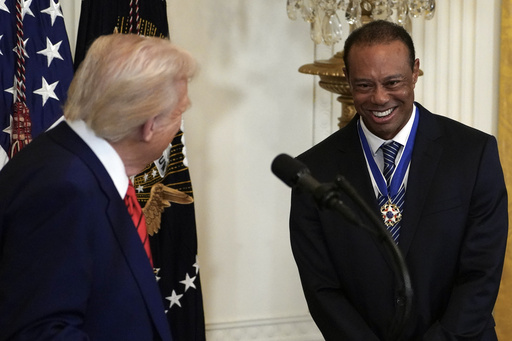
WASHINGTON — To commemorate Black History Month, President Donald Trump hosted a reception at the White House, which featured a surprise appearance by famed golfer Tiger Woods. During the event, Trump celebrated the attendees and acknowledged the impressive crowd gathered to honor the occasion.
In a notable development, Trump revealed his intention to appoint Alice Johnson, a prison reform advocate whom he pardoned back in 2020, to assist with clemency issues within his administration. This initiative comes during the White House’s annual observance of Black History Month against the backdrop of Trump having issued a sweeping executive order that eliminated federal programs focused on diversity, equity, and inclusion, disrupting the way this month is commemorated across various platforms.
“Today, we pay tribute to the generations of Black legends, champions, warriors, and patriots who helped drive our country forward to greatness. And you truly are remarkable people,” Trump expressed during his speech.
While he refrained from directly addressing his stance against diversity initiatives in his remarks to the hundreds of guests present, he did allude to the controversial “1619 Project” from The New York Times, which examines the enduring impact of slavery in America. Trump had previously criticized the project during his initial term and subsequently established the 1776 Commission to promote what he deemed patriotic education.
“The previous administration sought to reduce all of American history to one year, 1619. But under our leadership, we recognize the crucial role that Black Americans have always played in the timeless cause of 1776,” Trump said, praising that year as pivotal. He has labeled DEI programs as “discrimination” and advocated for their removal from federal operations, pushing the narrative that merit should take precedence over diversity.
This wide-ranging initiative has sparked confusion across federal agencies, as they interpret the order differently when it comes to acknowledging race and culture in their operations.
Attendees at the reception included several Black political figures and activists who have openly supported Trump. Noteworthy invitees were Republican Senator Tim Scott from South Carolina, Representative John James from Michigan, Alveda King, the niece of civil rights icon Martin Luther King Jr., Herschel Walker, whom Trump has nominated as U.S. ambassador to the Bahamas, and Alice Johnson.
Prominent figures from sports and entertainment were also in attendance, such as former ESPN host Sage Steele and former NFL player Jack Brewer, along with rap artists Kodak Black, Lil Boosie, and Rod Wave, according to a White House source who spoke on the condition of anonymity.
Following Trump’s executive order, the Defense Department issued directives that effectively terminated recognition of “identity months” and stated that federal working hours would no longer be allocated for observances related to cultural awareness months like Black History Month. This stance appeared contradictory to Trump’s own proclamation recognizing Black History Month, which advocated for public officials, educators, and citizens to observe the month with appropriate programs.
Despite the administration’s official position, individual government agencies retain the discretion to engage in Black History Month celebrations. For instance, on the very first day of February, Transportation Secretary Sean Duffy announced his department’s decision to refrain from participating in identity-based celebrations. In line with this, Secretary of State Marco Rubio indicated that the agency would eliminate DEI policies as part of an effort to avoid divisive political and cultural issues, both domestically and internationally.
Every U.S. president since 1976 has acknowledged Black History Month, and Trump included this recognition during his first term. CJ Pearson, a national co-chair of the Republican National Committee’s youth advisory council, stated, “Black History is American history. Like our nation’s narrative, it embodies strength, resilience, and perseverance.” Pearson, who has defended Trump against criticisms from civil rights advocates, argued that Trump’s policies may not promote racism but rather seek to fulfill Martin Luther King, Jr.’s dream of a society where individuals are judged by their character rather than the color of their skin.
However, not all Black Republicans share this optimistic outlook on the administration’s direction or its implications for the GOP’s relationship with Black voters and other minority communities. “If Trump does not enhance the coalition he built last November with Black, Asian, and Hispanic individuals, he risks dismantling the very alliance that proved successful,” observed Republican strategist Raynard Jackson.
Jackson criticized the removal of DEI frameworks, suggesting that it could render the White House vulnerable to accusations of discrimination if no alternatives are provided for helping disadvantaged communities succeed. “How can diversity exist without some form of mandate?” he queried. “They’ve clearly articulated their opposition, but I’m keen to know what they’re advocating for.”
During the 2024 campaign, Trump made efforts to connect with Black voters through events in cities like Atlanta, Chicago, and New York, engaging with Black celebrities to amplify his message. Additionally, allies like Representative Byron Donalds organized community-focused initiatives aimed at minority audiences, while Trump’s rhetoric often included dismissive remarks about Black neighborhoods, portraying immigrants as competitors for jobs typically held by Black and Hispanic individuals.
Despite the mixed messages, there were signs of increased support for Trump among Black voters in the latest election cycle. He garnered a greater share of the Black vote compared to his previous campaign—especially among younger Black men—according to a nationwide survey conducted during the 2024 election. Overall, around 16% of Black voters backed Trump, a significant increase from the 8% he received in 2020, although the majority still voted for Democrat Kamala Harris.

